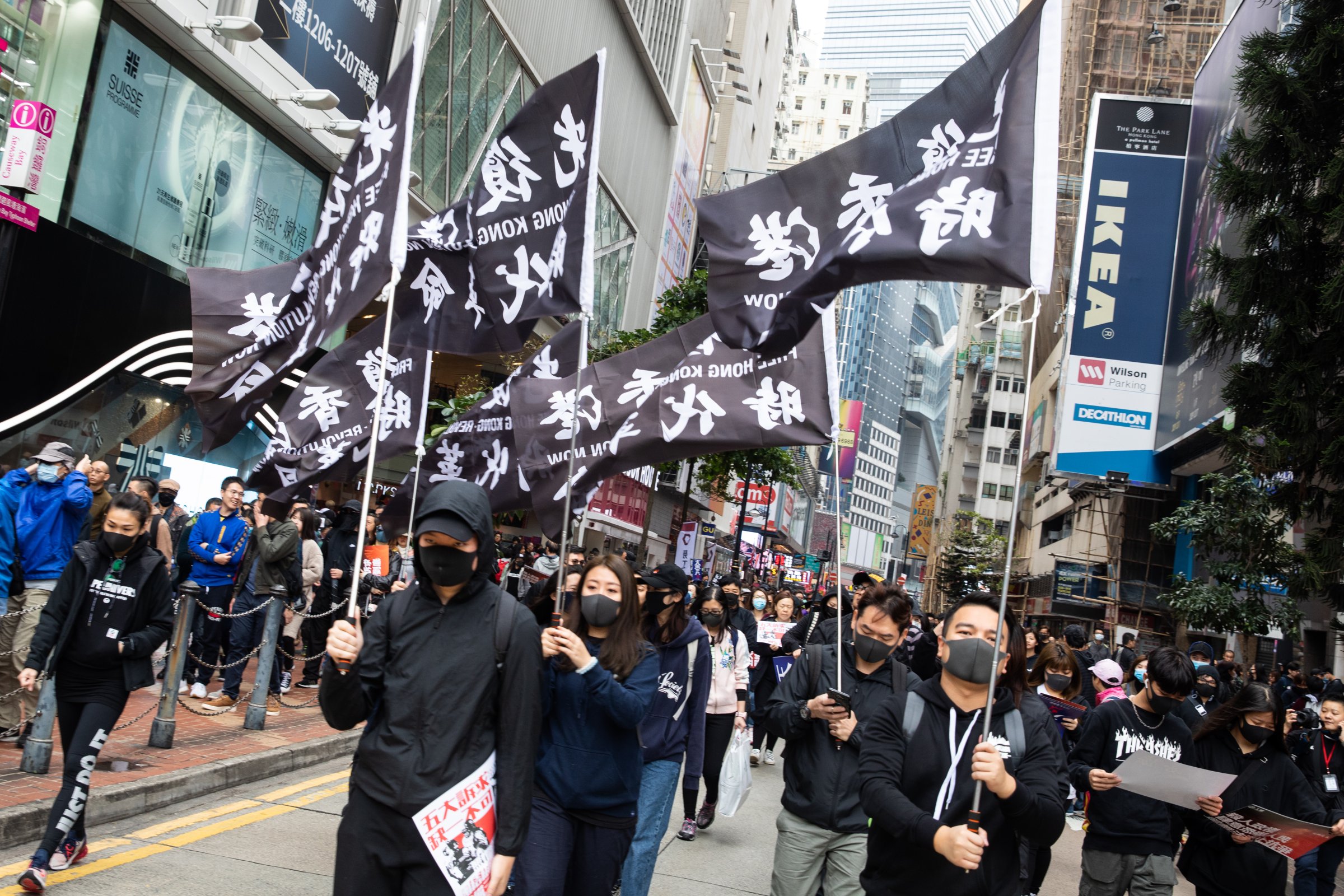
Hong Kong began 2020 with more protests as crowds marched through downtown districts on New Year’s Day to call for greater political freedom.
Local media reported that the city’s Victoria Park—the traditional staging ground for large protests—began to fill up from the early afternoon. Marchers chanted “Liberate Hong Kong” and carried flags reading “Revolution Now.” Others held banners calling for independence.
Although the march began peacefully, protesters and police soon began exchanging petrol bombs and tear gas. Live news streams showed the premises of some businesses with mainland Chinese connections being vandalized and smashed.
Branches of HSBC were also vandalized. One of the bronze lions outside the HSBC headquarters on Queen’s Road—iconic statues that have survived wartime occupation—was set on fire.
The bank has been a target since it closed an account set up by a nonprofit organization after finding that it “was not being used for its stated purpose” of providing aid to protesters.
Tensions rose as dusk fell, when protesters were ordered to disperse. Many instead pressed on to the march’s destination in the financial district, while others set up barricades across major thoroughfares and engaged in standoffs with police.
The government issued a statement early Wednesday evening saying that “the top priority now is to stop violence and restore social order as soon as possible so that the daily lives of people and various business activities can return to [their] normal track.”
Wednesday’s procession came in the wake of a restive New Year’s Eve that saw hundreds protesters form human chains and others barricade Nathan Road—the Kowloon peninsula’s principal artery—sparking clashes with police. A train carriage was set on fire by masked radicals in the early hours of Wednesday, but nobody was injured. Radicals also hurled petrol bombs into a train depot.
The traditional New Year’s Eve fireworks at Victoria Harbour, which normally draw large crowds, were canceled after police voiced fears for public safety.
In a New Year message, Hong Kong’s top official, Chief Executive Carrie Lam, said that the semi-autonomous territory “experienced challenges not seen before” during many months of unrest and that “we all want to see an end to this predicament.”
She pledged to “listen humbly to find a way out,” and added: “We must handle the problems at hand and acknowledge the shortcomings in our systems, as well as the deep-rooted problems and conflicts that have been accumulating for many years.”
Meanwhile, a group of 38 political figures from several countries—including the recently retired speaker of the House of Commons John Bercow and former U.K. foreign secretary Malcolm Rifkind—wrote to Lam, urging her to set up a probe into the Hong Kong police force’s handling of the unrest, which opponents say has been heavy handed.
The group said: “Should you continue to reject this idea, we call on the international community to establish an international, independent inquiry mechanism.”
The Hong Kong government has maintained that the territory’s Independent Police Complaints Council (IPCC) must be allowed to complete its report on the protests before another inquiry is considered, but critics—including a panel of overseas experts—say that it cannot do its work because it lacks the power to subpoena witnesses and documents.
The Hong Kong protests, now in their seventh month, originated in popular opposition to plans to allow for fugitives to be extradited to mainland China for the first time. Detractors feared that Beijing would use the provision to round up dissidents in the enclave.
The early protests have since escalated into an increasingly violent struggle against the local administration, with protesters demanding a fully elected legislature and popularly elected leader for the former British possession, retroceded to China in 1997 after 156 years of colonial rule.
Nearly 6,500 people have been arrested since the start of the unrest.
More Must-Reads From TIME
- The 100 Most Influential People of 2024
- Coco Gauff Is Playing for Herself Now
- Scenes From Pro-Palestinian Encampments Across U.S. Universities
- 6 Compliments That Land Every Time
- If You're Dating Right Now , You're Brave: Column
- The AI That Could Heal a Divided Internet
- Fallout Is a Brilliant Model for the Future of Video Game Adaptations
- Want Weekly Recs on What to Watch, Read, and More? Sign Up for Worth Your Time
Contact us at letters@time.com